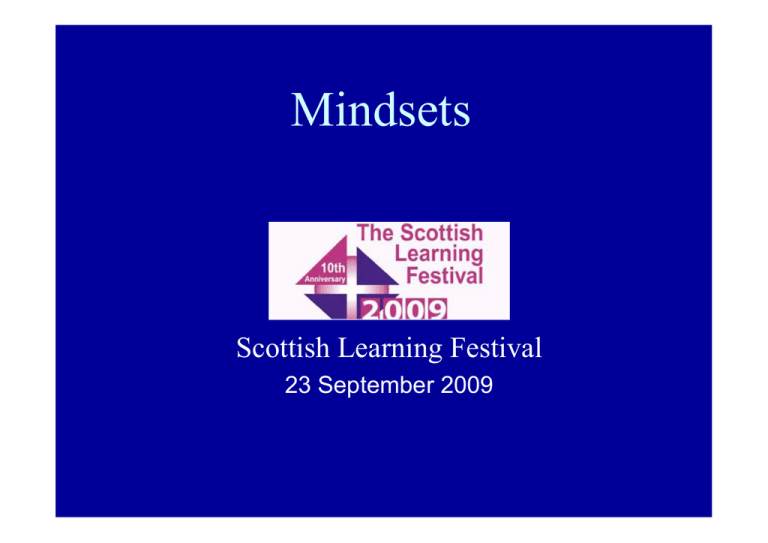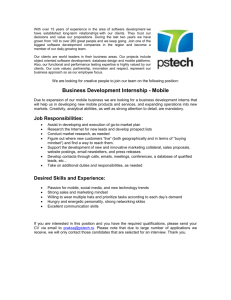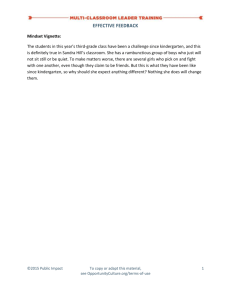Mindsets Scottish Learning Festival 23 September 2009
advertisement

Mindsets Scottish Learning Festival 23 September 2009 Learner or Non-learner? “I don’t divide the world into the weak and the strong, or the successes and the failures… I divide the world into the learners and non-learners.” -- Benjamin Barber How do we make sure our students remain learners? Mindsets Matter Fixed Mindset: Intelligence is a fixed trait Growth Mindset: Intelligence is a malleable quality; a potential that can be developed …Talent is a starting point Mindsets Matter • Which mindset is correct? • Does a person hold the same mindset in different life arenas? • Can mindsets be changed? How Do Mindsets Work? The Mindset Rules Mindset Rule #1 Fixed Mindset: LOOK CLEVER AT ALL COSTS Growth Mindset: LEARN, LEARN, LEARN Looking Clever vs. Learning Fixed Mindset Student: “The main thing I want when I do my school work is to show how good I am at it.” Growth Mindset Student: “It’s much more important for me to learn things in my classes than it is to get the best grades.” Blackwell, Trzesniewski, & Dweck, 2007 Math Achievement 77 76.5 76 75.5 75 74.5 74 73.5 73 72.5 72 growth Fixed Growth fixed Fall Year Spring Year Fall Year Spring Year2 1 1 2 Pre-Medical Students Organic Chemistry Grades Learners and Non-Learners in Action How do mindsets control our attention? Mangels, Butterfield, Lamb, Good & Dweck, 2006 Paying Attention to Learning Ability-Relevant Feedback Question “Who was the Union general at the battle of Gettysburg?” Person types answer * 1.5 s or * 1s 1.5 s Correct answer 2s Learning-Relevant Feedback REFLECTION Think about a time you were in a fixed mindset and chose to be a non-learner. What could you do differently in the future? Mindset Rule #2 Fixed Mindset: IT SHOULD COME NATURALLY “To tell the truth, when I work hard at my school work it makes me feel like I’m not very smart.” Growth Mindset: WORK HARD, EFFORT IS KEY “The harder you work at something, the better you’ll be at it.” Do Geniuses Work-Or Does it Just Come Naturally? Mindset Rule #3 IN THE FACE OF SETBACKS… Fixed Mindset: HIDE MISTAKES CONCEAL DEFICIENCIES Growth Mindset: CAPITALIZE ON MISTAKES CONFRONT DEFICIENCIES Deficiency Equals… After Setback Fixed Mindset: “I’d spend less time on this subject from now on.” “I would try not to take this subject ever again.” “I would try to cheat on the next test.” Growth Mindset: “I would work harder in this class from now on.” “I would spend more time studying for the tests.” Blackwell, Trzesniewski and Dweck, 2007 Fixed Mindset provides no recipe for recovering from failures: • Giving up, retreating to comfort zone • Blaming others • Trying to feel superior Where Do Mindsets Come From? Our language tells students what we believe and what we value Non-Verbal IQ Test Messages About What We Value • Intelligence Praise: “Wow, that’s a really good score. You must be smart at this.” • Effort (Process) Praise: “Wow, that’s a really good score. You must have tried really hard.” Mueller & Dweck, 1998 Intelligence vs. Effort Praise • Mindset: Fixed vs. Growth • Goals: Looking smart vs. Learning After Difficult Trial: • Confidence: Low vs. High Number of problems solved on Trial 1 (before failure) and Trial 3 (after failure). Number of Problems Solved 6.5 6 Effort Praise Control Praise Intelligence Praise 5.5 5 4.5 Trial 1 Trial 3 Lying Students who misrepresented their scores 0.4 0.3 0.2 0.1 0 Intelligence Control Type of Praise Given Effort What to Praise • Effort, struggle, persistence despite setbacks • Strategies, choices • Choosing difficult tasks • Learning, improving Low Effort Success: Yesterday • Look, you got an A without really working. You’re really good at math! • You did that so quickly and easily. That’s impressive! Low Effort Success:Tomorrow • You got an A without working. You must not be learning much. • You did that so quickly and easily. I’m sorry I wasted your time. Let’s do something you can learn from. REFLECTION What is one thing you could do differently in your interactions with your students or staff to foster a growth mindset? Changing Mindsets A Mindset Workshop • Growth Mindset Group: 8 sessions of study skills + the growth mindset. • Control Group: 8 sessions of great study skills. Math Grades (Blackwell, Trzesniewski, & Dweck) 2.8 2.7 2.6 Control 2.5 BraInology 2.4 2.3 2.2 Before After Percent Showing Increased Motivation 30 27 25 20 15 10 9 5 0 Control Growth 5 Computer Modules Teachers’ Guide www.brainology.us Brain Orb as Guide Visit to Brain Lab Mad Scientist Brain Experiments The Learning Brain Have you changed your mind about anything? • My favorite thing from Brainology is the neurons part where when u learn something there are connections and they keep growing. I always picture them when I’m in school (khadija) • Yes … I imagine neurons making connections in my brain and I feel like I am learning something. (biggie) Conclusion A growth mindset allows students to: • Embrace learning and growth • Understand the role of effort in creating talent • Maintain confidence and effectiveness in the face challenges and setbacks …and it can be taught. One Final Note A Growth Mindset for Educators Too • As educators, we must constantly learn and improve. • Educators, too, need permission to learn and make mistakes • If we don’t fulfill our potential how can we make our the students fulfill theirs? Thank you!

